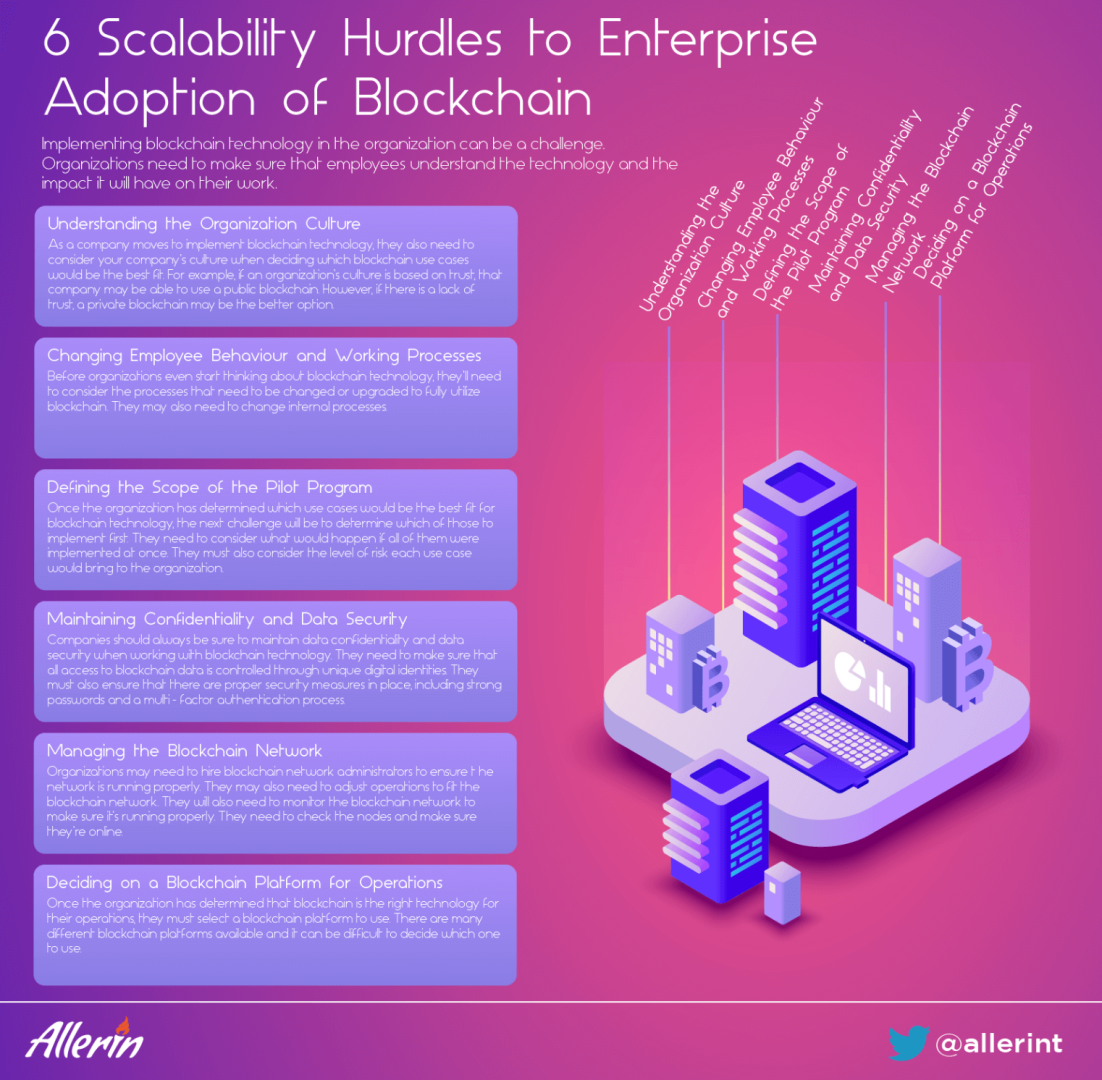Comments
- No comments found

Implementing blockchain technology in the organization can be a challenge.
Organizations need to make sure that employees understand the technology and the impact it will have on their work.
In the world of technology, things change at a rapid pace. New innovations crop up every day and companies have to keep up to remain competitive. Many businesses are aware of the advantages blockchain technology offers and are exploring its use cases in their organizations. However, implementing a new system is not easy. There are many processes that need to be changed and upgraded to utilize blockchain effectively — this is something that most companies don’t realize until they begin working on it. Whether you’re currently researching use cases for blockchain or already have some pilot programs running, there will be challenges along the way. Scaling any new technology from proof-of-concept to production can be difficult, especially if it involves several different departments within your company. Here’s a look at some of the main challenges organizations face when scaling blockchain operations in their organization.

The first thing to understand is the organizational culture. How are decisions made within the organization? Are new ideas welcomed, or does an employee need to go through several layers of approval? Is there an understanding of the need to embrace new technologies? These are all important factors to be aware of as a company moves to implement blockchain technology. They also need to consider your company’s culture when deciding which blockchain use cases would be the best fit. For example, if an organization’s culture is based on trust, that company may be able to use a public blockchain. However, a private blockchain may be the better option if there is a lack of trust.
Before organizations even start thinking about blockchain technology, they’ll need to consider the processes that need to be changed or upgraded to fully utilize blockchain. For example, if the operations currently rely on centralized databases, the organization will need to upgrade to a decentralized model to run on the blockchain. They may also need to change internal processes. For example, if the organization is using smart contracts to manage supply chain operations, employees will have to use different tools to access that information. Before the organization starts implementing blockchain technology in their operations, they will need to determine what processes and information need to be decentralized. Then, they must decide how to implement blockchain technology to achieve those goals. They will also need to determine how to change internal processes if necessary.
Once the organization has determined which use cases would be the best fit for blockchain technology, the next challenge will be to determine which of those to implement first. They need to consider what would happen if all of them were implemented at once. How much would it cost? How much time would it take? How many resources would it require? They must also consider the level of risk each use case would bring to the organization. For example, they may want to start with a use case that has less risk and higher reward than others.
Companies should always be sure to maintain data confidentiality and data security when working with blockchain technology. They need to make sure that all access to blockchain data is controlled through unique digital identities. They must also ensure that there are proper security measures in place, including strong passwords and a multi-factor authentication process. They need to consider how to protect the blockchain network itself. If they are using a public blockchain, they may be able to use a built-in solution to do so. However, if they are using a private blockchain, they will need to find a way to protect the network.
While blockchain technology offers many benefits, it can also be challenging to manage a network. Organizations may need to hire blockchain network administrators to ensure the network is running properly. They may also need to adjust operations to fit the blockchain network. For example, if they are using smart contracts, they will need to make sure the conditions are correct for them to run. They will also need to monitor the blockchain network to make sure it’s running properly. They need to check the nodes and make sure they’re online. They will also need to check the network to make sure that everything is operating as it should.
Once the organization has determined that blockchain is the right technology for their operations, they must select a blockchain platform to use. There are many different blockchain platforms available and it can be difficult to decide which one to use. Here are some things to consider when choosing a blockchain platform for your operations:
What is the current state of the blockchain network? In what condition is the network? How many nodes are there?
Is there a solution for managing the blockchain network? Can the organization view nodes and check the status of the network?
What type of blockchain network does the platform use? Is it public or private?
Is there support for the blockchain platform?
What type of security measures does the blockchain platform use? Is it GDPR compliant?
Implementing blockchain technology in an organization can be a daunting task. However, it serves several benefits that businesses cannot ignore anymore. Hence, the organization must ensure that there is trust within the organization for blockchain implementation. If the company has an open culture, it will likely have an easier time implementing blockchain technology.
Naveen is the Founder and CEO of Allerin, a software solutions provider that delivers innovative and agile solutions that enable to automate, inspire and impress. He is a seasoned professional with more than 20 years of experience, with extensive experience in customizing open source products for cost optimizations of large scale IT deployment. He is currently working on Internet of Things solutions with Big Data Analytics. Naveen completed his programming qualifications in various Indian institutes.
Leave your comments
Post comment as a guest